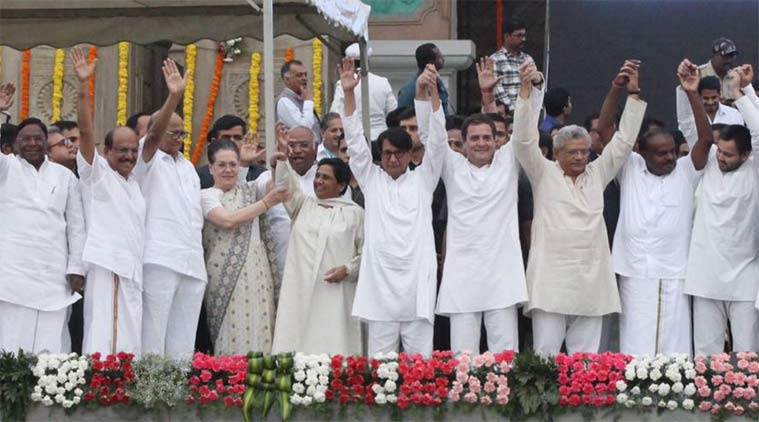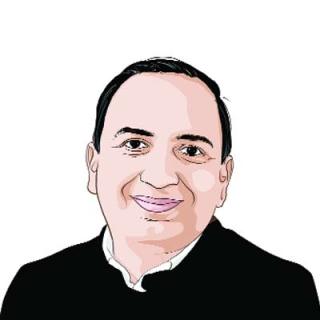A means of re-invention
For anti-BJP coalition to succeed, the Opposition must see it as an idea, not just an adjustment
 The public spat between the Congress and Aam Aadmi Party over seat arrangements in Delhi has once again opened up a conversation about the Opposition’s ability to coordinate a united front against the BJP. Talks between the Congress and other parties are still on in many states. It is also inevitable that seat adjustment arrangements take into account hard arithmetic realities on the ground: Will a party be able to transfer its core social base to the candidate of another party? Whose votes will a party cut? But in the forthcoming election, the objectives of coalition politics cannot be based merely on a short-term calculus. The purpose of coalition politics has to be to overcome past resentments and the nit picking of mere arithmetic. It has to convey a unity of purpose that transcends a politics where parties cannot see beyond their own noses. Coalition politics has to be an idea, not just an adjustment.
The public spat between the Congress and Aam Aadmi Party over seat arrangements in Delhi has once again opened up a conversation about the Opposition’s ability to coordinate a united front against the BJP. Talks between the Congress and other parties are still on in many states. It is also inevitable that seat adjustment arrangements take into account hard arithmetic realities on the ground: Will a party be able to transfer its core social base to the candidate of another party? Whose votes will a party cut? But in the forthcoming election, the objectives of coalition politics cannot be based merely on a short-term calculus. The purpose of coalition politics has to be to overcome past resentments and the nit picking of mere arithmetic. It has to convey a unity of purpose that transcends a politics where parties cannot see beyond their own noses. Coalition politics has to be an idea, not just an adjustment.The BJP is the front-runner compared to any other single party. And its return to power with a big majority will put question marks over the survival of a credible Opposition. Given the fluidity of politics, this may be one of those elections where every vote and every seat counts. The BJP’s high vote share to seat conversion ratio has, in the past, been facilitated by a lack of Opposition unity. The high stakes should concentrate the Opposition’s mind, and push them to strive for something close to the objective of one candidate per constituency, with some tactically-chosen exceptions. But they, and in particular the Congress, also need to think about what projecting the power of coalition means in 2019, as compared to previous occasions.
It will be a mistake for the Opposition to think it can easily make a distinction between local and national politics. The issues that are rebounding in elections, from national security to communalism and from the economy to corruption, are all national issues. And even if it is a local party, people look to see how it handles these issues nationally. A credible coalition politics does many things simultaneously. It projects the idea that any given local party is part of a broader framework of thinking, and has the right connections to be able to leverage its power for national issues. This is particularly true in an era in which the social bases of voting have become much more fluid. Even in a state like UP, except for core groups like Jatavas and Yadavs, the broader categories of SC/OBC votes can easily be divided across political parties. In short, attracting votes is not just about taking it for granted that one can simply add the social base of one party to another. It is also about a larger narrative on offer, that no party can do on its own.
Second, each of the political parties in the current Opposition has its own past. The biggest disappointment of the last five years is that none of them, from the BSP to the Congress, have done enough to substantially reinvent themselves in their functioning, ideology or imagination. There has been no major churn. But being part of a credible coalition is the only radically new thing they can offer: The idea that the SP and the BSP can overcome their past animosity and the traditional hostility of their social base is itself the new thing, rather than the attributes of each of those parties. Coalition should be taken as the means of reinvention rather than the status quo.
This is particularly true of the Congress, which has the most to gain by a coalitional generosity. The Congress’s besetting sin is that it still projects a culture of entitlement. It has not overcome its past as effectively as it should. Even the most ardent Congress supporter, looking at many of Congress’ frontline faces, privately goes, “not the same old lot again, the architects of UPA 2’s disaster”. The worrying thing is that while Rahul Gandhi is projecting a more aggressive and mature face externally, there are still doubts about how much he has managed to get his own party to heel. The dramas over chief ministership in Rajasthan and Madhya Pradesh and the reluctance to sideline the old liabilities of the Congress speak to that weakness. In states like Rajasthan, that is causing more vulnerability than necessary. God knows who took the decision but the Congress not supporting an arrangement with the AAP in a state like Delhi is either an indication of entitlement or weakness of the leadership. It is being penny wise, pound foolish.
Third, nationalism is a big theme in this election. The BJP will not only project that it is the only national party; it has managed to stitch together its allies. It is also going to project the idea that only it represents national interest, over and above sectarian, regional or family interests. The more the Opposition projects the idea that this is not a contest between one cohesive force on the one hand, and a divided Opposition on the other, the better chance it stands. This time the objective has to be not just that a coalition is being crafted, but that an alternative, more diverse basis for national unity is possible. To paraphrase Edmund Burke, large nations and small minds go ill together. The bickering over small coalitions may not look arithmetically significant. But it can be read as a sign of a myopic regard for self-interest.







































No hay comentarios:
Publicar un comentario